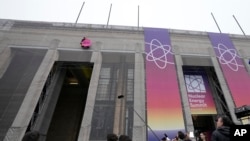More than 30 global leaders and delegations pushed for the increased research, funding and implementation of nuclear energy Thursday at a summit in Brussels hosted by the International Atomic Energy Agency, also known as the IAEA.
The summit involved European countries, as well as the United States, Brazil and China. It comes after last year's United Nations environmental summit COP28, in which 22 leaders backed nuclear energy.
The push for nuclear energy is to meet global environmental goals and move away from a reliance on coal and oil, particularly as many European countries have moved away from Russia as an oil source following its full-scale invasion of Ukraine in 2022.
Proponents of nuclear energy argue that it is an efficient, low-carbon renewable source of energy. Opponents, however, point to the potential dangers of nuclear energy, raising accidents such as the 1986 nuclear meltdown in Chernobyl, Ukraine, or the more recent accident in Fukushima, Japan, in 2011.
Among those leading the charge for nuclear energy is France, which leads the world in electricity generated by nuclear power. In response to the potential risks of using nuclear energy, French President Emmanuel Macron said, "we should be more worried … about CO2 emissions that have a direct impact on our health every day."
Rafael Grossi, the IAEA director general, said "It took 28 conferences on climate change to recognize, at long last, that nuclear should be accelerated," adding that it's "better late than never."
Among the opponents of nuclear energy are countries like Austria and Germany. The latter removed all nuclear power plants following the 2011 nuclear incident in Japan.
Other environmental activist organizations also oppose the measure. Lorelei Limousin of Greenpeace said "Nuclear, all the evidence shows, is too slow to build. It's too expensive. Much more expensive than renewables." Limousin added that the world should focus instead on developing renewable energy, rather than what she called "nuclear energy fairy tales."
Although many leaders showed support for nuclear energy, barriers remain to its implementation, such as a lack of funding for nuclear research.
The 2021-2025 budget for the European Union's primary research body for nuclear energy was cut by 20%. Bernard Magenhann, the deputy director general of the joint research center of the EU, told reporters this week that "We have lost competencies with an aging population [among nuclear workers] and we must take care of the replacement of skills in the near future." He added that if we do not "re-skill new talent" within 10 years, "we will be in a difficult situation."
Another barrier that remains is restrictions for funding nuclear projects among development organizations such as the World Bank. Grossi, commenting on funding restrictions, said, "We still have an international and institutional architecture that forbids financing of nuclear projects."
The U.S., which supports the France-led push for nuclear energy, expressed support for eliminating funding restrictions.
John Podesta, the senior advisor to the U.S. president for clean energy, said, "We're supporting the French initiative to encourage the World Bank and other development banks to eliminate the restriction on funding nuclear."
A joint statement was released by global leaders at the summit, expressing support for bolstering nuclear energy.
Leaders said they will "commit to fully unlock the potential of nuclear energy" by working to support and finance existing nuclear reactors.
Some information for this report came from Reuters, The Associated Press, and Agence France-Presse.





